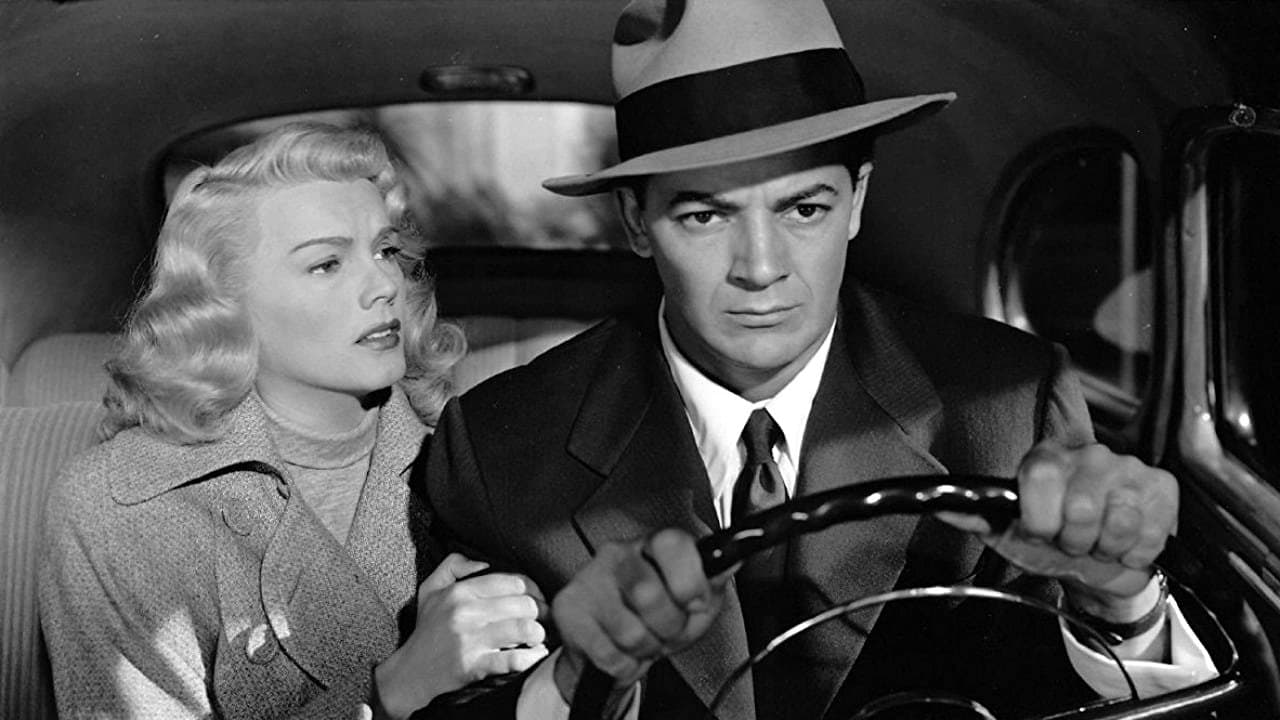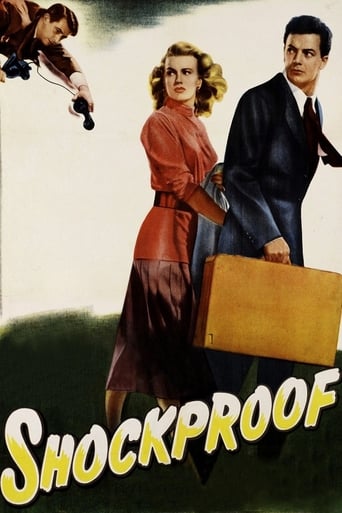

Douglas Sirk and Sam Fuller. Not a likely pairing in any producer's shortlist, the legendary director and iconic screenwriter came together one time to show maybe why conventional wisdom has a point now and then.It's the story of Griff Marat (Cornel Wilde) and Jenny Marsh (Patricia Knight), a parole officer and parolee who crime brings together, first as a matter of bureaucracy and later as outlaw lovers. It doesn't sound like a bad idea, but neither Sirk nor Fuller are at their best here.We open on a shot of Jenny going into a dress store to purchase a new outfit. If you were expecting a car chase or a scene of Jenny's arrest, forget it. This is a Douglas Sirk film; just be glad we don't spend the next 15 minutes watching Jenny make her face.After that, Fuller takes over with his on-the-nose dialogue. Jenny's not bad, Griff keeps insisting in his salt-of-the-earth Fuller way, she just needs a new direction. "I'm counting on her meeting some normal, decent people," which is too bad because they live in L. A.The basic idea of the film is that love conquers all, or at least keeps one from looking both ways before crossing into traffic. This is the only rationale for Griff transforming from tough parole officer, not even looking up to greet Jenny when she first steps into his office, to cheerful chipmunk who can't wait to take the convicted killer with a chip on her shoulder to meet his blind mother and tagalong kid brother.The performances are actually pretty good, given the dicey material. Wilde has a smooth delivery that almost sells his character despite a glaring absence of professionalism, while Knight's brittle beauty draws us in and makes us wonder about her motives. Sirk works the scenes around her, and Knight delivers when the "I'm-no-good" dialogue isn't choking her.The best work is John Baragrey as Harry Wesson, the guy Jenny took the rap for five years ago and who still wants her, in his jaded but determined way. Baragrey delivers prime Fuller wisecracks in such a cool, off-handed manner, I kept begging for him to show up while Jenny read love poems to Marat's mom. Baragrey's smugitude is off the charts, and delightful."Excuse me while I push Humpty Dumpty off his wall."No, you'll break his heart."That's the idea. You catch on quick, Jenny."It's a shame Baragrey didn't get more film work. He'd be my Doe Avedon candidate for best performance in a bad film, 1949, if only for the fact "Shockproof," dull and silly as it often is, never sinks quite so low as to be called "bad." It has an energy, moving at a quick pace. The scenes of Griff and Jenny slinking through the shadows, wondering if their story made the local papers, are marvelously acted and well-shot. The problem is they come too late and don't get much time for development before everything's wrapped up in a bizarre ending.It's the one part of the movie even supporters agree doesn't work. Here's the thing: I liked it. No, it doesn't make sense, but it breaks the formula the rest of the film so doggedly follows. Most important, it gives my man Baragrey a chance to deliver the final line, and it's a beaut.OK, if you enjoy Sirk and Fuller, you will see things here to engage and interest you. It's not a well-made film, but it's an interesting effort, and there are scenes, lines, and moments that show you why both men would make screen history – so long as they listened to the parole board and kept a healthy distance from one another.
... View MoreThey say it's the journey, not the destination, that usually counts with stories. In the case of Shockproof it's good to just focus on the journey, in all its B-movie-ness and, yes since it is Douglas Sirk, melodrama, because the destination kind of stinks. The film's story concerns a beautiful blonde parolee played by Patricia Knight who is put into the watchful eye and soon enough loving arms of her parole officer, Cornell Wilde. She's been wanting to get back together with her former lover, a gambler-hustler named Harry Wesson, who by the look of the guy is sleazy but perhaps not too bad a shake for a 'dame' like Knight plays. But the parole officer wants a better life for her, and that she knows it too. Soon she does, after some persistence, fall for Griff, but at a price when another character gets (preumably) murdered after a gunshot.It becomes a lovers-on-the-run story, and, not to quote Harry's own line about the melodrama I mention above, this twist does bring some melodrama with it as the characters try to evade the law, cross into Mexico, go back into the states and Griff becomes an oil-drill worker. But the main problem of being on the lam catches up to them, and finally a decision is made. It's around here, in just the last few minutes, that the film really crumbles into predictability (and, to be fair, it wasn't Fuller's idea as the producer rewrote the script before filming). The acting and the script up until that point, however, does deliver on the promise of a simple premise. There's nothing terribly special about the story, but it works on its own terms as a tale of a love-triangle gone awry. We know the situation might be different if a character did something smarter, or did something more drastic or if, say, Harry went more into an actual criminal role and just ran off with Jenny to start with after she got out of prison.But as it stands the performances are just fine- even the one-note crooning of the blind mother of Griff's who knows what she knows even without seeing, a real Fuller caricature if I ever saw one- and when it comes off like a real film-noir, with edge and believability, both of the legends Sirk and Fuller can get credit. It's no great shakes, but it passes 80 minutes by with some rich emotions and a, with a few exceptions in some scenes, solid dramatic turns and directions made by the characters.
... View More"Shockproof" brought together the disparate talents of two men who were both destined to achieve their greatest successes as directors in the 1950s. Samuel Fuller who wrote the screenplay had previously worked as a newspaper crime reporter and had also written pulp novels. His simple and forceful style used tabloid and pulp influences to produce a script which is full of drive and colour. Douglas Sirk, who directed the movie, was a sophisticated man whose instincts leant more towards the polished style which in later years, characterised the glossy melodramas for which he became famous. Forbidden, inappropriate or doomed love affairs provide powerful material for melodramas and whilst the relationship depicted in "Shockproof" offered Sirk the kind of subject matter which instinctively appealed to him, the extreme and criminal consequences it produced very much suited Fuller's style of writing.When Jenny Marsh (Patricia Knight) is released from prison, her parole officer Griff Marat (Cornel Wilde) gives her a list of strict conditions which she is required to adhere to in order to avoid being sent back into detention. One of the most important ones (besides not getting married) is that she must stay away from Harry Wesson (John Baragrey), a smarmy gambler who was partly responsible for the events which led to her conviction. Marat is annoyed when, despite being set up with a job and a place to live, she persists in seeing Wesson and is even caught by the police when they raid a bookie's business. As he's convinced of her potential to reform, Griff employs her in his own home looking after his blind mother, an arrangement which he feels will be helpful to give her first hand experience of family life and also keep her away from the attentions of Harry Wesson.Griff falls in love with his parolee and proposes marriage. She turns him down but when Harry hears about the proposal he puts pressure on Jenny to accept because this would make Griff an accomplice to breaking the terms of her parole. Jenny and Griff get married in secret but one day Harry phones Griff and starts to tell him something about Jenny. Their conversation is suddenly interrupted when a shot is heard. When Griff finds out that Jenny has shot and seriously wounded Harry (and it's uncertain whether he'll survive), the couple go on the run with the intention of escaping to Mexico. The problems they encounter in trying to evade the police eventually become so intolerable that they decide to turn themselves in. When they do however, the events that follow come as a great surprise.Although Griff is a very conventional and ambitious man with an ideal family life, when he becomes attracted to Jenny, a startling change occurs and a great deal of crazy stuff follows. His intelligence and powers of judgement seem to desert him, otherwise why would he invite a convicted murderer to work in his home and look after his blind mother? Why would he marry her knowing that his complicity in breaking the terms of her parole would damage his reputation and jeopardise his career? His lack of concern about the fact that she attempted to murder Harry is remarkable and it's amazing how readily he goes on the run with her and also how quickly he resorts to criminal action when the need arises. He also seems to suddenly ignore the implications of his actions in terms of how they will impact on his family and his political ambitions."Shockproof" provides an account of how powerful passions can derail the lives of even the most conservative and respectable of people but does so in a way which is entertaining, fast paced and competently acted. Unfortunately, a studio imposed ending does detract from the power and the credibility of the story, but this short low budget movie still, nevertheless, remains interesting and well worth seeing.
... View MoreThere's a world of difference between Cornel Wilde's previous film, Roadhouse, and this one and it's not entirely due to the casting - Roadhouse boasted a great quartet in Wilde, Richard Widmark, Ida Lupino and Celeste Holm, whereas her we get Wilde, period, and Jean Negulesco handled Roadhouse better than Douglas Sirk handles Shockproof (a meaningless title having nothing to do with the story. Considering they'd been married a good decade there's remarkably little chemistry between Wilde and Patricia Knight or indeed between anyone in the cast and anyone else. The protagonists meet in the first minute, she a parolee, he her parole officer and you can bet the farm he's going to fall for her despite his 'tough' attitude. It's all fairly predictable but Sirk was a decent craftsman and is able to salvage something ... not much, but a little. For Sirk completists only.
... View More